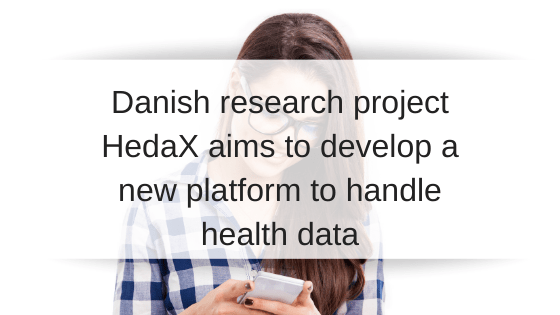
Research project HedaX aims to develop a new platform to securely handle health data
Copenhagen Demark – 22 June 2020. The Research Project HedaX received EUR 16 million from the Danish Innovation Fund to develop a digital platform that can securely collect and exchange health data. This tool will provide researchers with the basis to offer better, personalised medicine.
In the current world situation, the proliferation of a new virus has had fatal consequences for society. However, the spread of infection can be curbed by collecting and exchanging data; this data exchange needs to take place without compromising an individual’s privacy. The Research Project HedaX aims to develop a digital solution that collects and exchanges personal health data anonymously and securely.
THE DANISH RESEARCH PROJECT HEDAX HAS A SOLUTION
The Research Project HedaX project will initially test the solution in two pilot projects that involve 1,000 cancer patients and 1,000 people with bipolar disorder. The goal is to use this new health data to gain insight into how the treatment is helping patients, and to demonstrate that sharing personal health data can help develop better-personalised care.
The Research Project HedaX involves ten public and private partners that will work together to develop a platform that ensures health data is securely collected and exchanged between individuals, healthcare professionals, and researchers.
The data collected by the solution would include an individual’s medical history, medication compliance, and personal sensor data, which is the data collected by most fitness apps.
The analysis of this data should provide a basis for better and cheaper treatment in the form of personalised medicine. The platform should also be used to monitor the spread of an infection confidentially, so that it is possible to identify where the infected individuals are located, without knowing who they are.
The newly developed platform should include the latest and most secure data encryption from various sources, such as the individual’s mobile phone, to the Social Security Registry and government’s databases.
Individuals should be able to get an overview and insight into the data that is being used, the entity using the data, and its purpose.
The Monsenso mHealth solution will be used to collect objective and subjective data from 1,000 individuals with bipolar disorder. The data will be anonymised and incorporated to the Registry data and EMR data to provide a new foundation for deep phenotyping, personalised medicine and overall understanding of real-life drug effectiveness.
“During the past five years, the Monsenso mHealth solution has been used in different research projects around the world to securely collect and share data between individuals with a mental illness and their healthcare professional. The scope of the project is rather familiar to us, and we are looking forward to participating in this project and helping individuals maintain their privacy while their data is safely collected and used to improve future treatments,” says Thomas Lethenborg, CEO of Monsenso.
The HedaX partners:
Secata is a pioneer in the commercial application of advanced encryption for data sharing. Their technology is based on more than 20 years of groundbreaking research in secure multiparty computation.
The Data for Good Foundation is a newly established foundation with non-profit purposes, based on GDPR legislation, that helps individuals share and retain control over their data.
DataFair is an entrepreneurial company with a particular focus on data-driven innovation and personalised medicine based on Denmark’s reliable health data.
The Alexandra Institute works with applied research in the field of digitisation and has helped develop encryption technology within the health sector.
The Danish Cancer Society is Denmark’s largest patient organisation.
Lundbeck is a Danish pharmaceutical company working on the development of pharmaceuticals within psychiatry and neurology.
Monsenso is a Danish company that develops mobile health solutions that help individuals collect information on their mobile phone to use it for prevention and treatment.
The Danish Capital Healthcare Region (Region H) offers Monsenso’s solution to patients within psychiatry.
DPO Management advises on secure and confidential sharing of data with a focus on GDPR rules.
Clinical Epidemiological Department at Aarhus University works with analysis of health data.
To read the Danish version, click here.
For additional information contact:
Jennifer Highland
Marketing Consultant
marketing@monsenso.com
Monsenso
